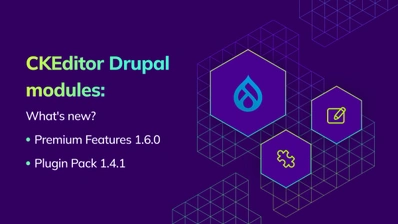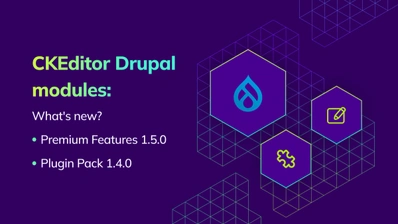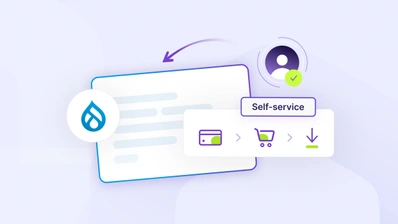Drupal Premium Features module now stable

Since its beta release in September 2022, the Drupal Premium Features module has allowed users to quickly integrate collaboration and productivity features into their projects. Now that it’s production ready, let’s take a look at all the CKEditor 5 features and exclusive capabilities that the stable version offers.
As long-time partners, both CKEditor and Drupal are committed to providing quality solutions for content creation. Initially, CKEditor 4 was included in Drupal 8 core, and after a massive collaborative effort, CKEditor 5 is now the default editor in the latest Drupal 10 core.
The best news is that CKEditor 5 definitely lives up to its next-generation rich editor moniker – offering you yet another leap forward that’s easy to take.
What’s in the Drupal Premium Features module?
The Drupal Premium Features module is a contributed module that adds premium features to CKEditor 5 in the Drupal core.
While the default Drupal editor is Open Source and free to use, the activation of the Drupal Premium Features module requires a license key. A license key can be obtained by signing up for a 30-day free trial, after which you can contact us to purchase a license. The module includes collaboration features such as:
- In-document comment threads
- Track changes
- Real-time collaboration
- Notifications
There are also productivity features such as:
- Export to PDF & Word
- Import from Word
- Mentions.
But these are just plugin names. Let’s get into the nitty-gritty of the features, and how and why they may help you with your next Drupal project.
Drupal 10 is now more collaborative
It’s true that Drupal’s suitable for many different use cases – from content, documents, and commerce management, to web or internal application frameworks. But across all of them, one capability has become mandatory: collaboration.
Currently, users are forced to use solutions outside of Drupal, to communicate their feedback on content, and to manage the review and revision stages – which spreads the content management process across multiple platforms. That can all change, when you integrate the Drupal Premium Features module.
By installing the module, you have access to a ready/drop-in solution for all your collaboration needs, and it consolidates the entire content creation workflow within Drupal. Sounds perfect? Let’s get into the details of what it does for you…
Comments
You no longer have to imagine a feature that allows you to comment anywhere on your content, then edit, delete, or reply to comments and create comment threads for longer discussions. This feature does it all.

Track Changes
Review and revision stages are already challenging, so instead of sending them via email or chat, how about simply activating the suggestions mode in CKEditor 5?

Revision History
Using the Revision History feature you can create, view and manage versions. It also allows you to compare versions and restore content to a previous one if needed.
![Revision History makes versioning available right inside the editor UI]](/blog/drupal-premium-features-module/image03.gif)
Real-time Collaboration
This is the cherry on top that gives you a round collaboration experience. It lets you concurrently work on content with other users, and see the active users in real-time.
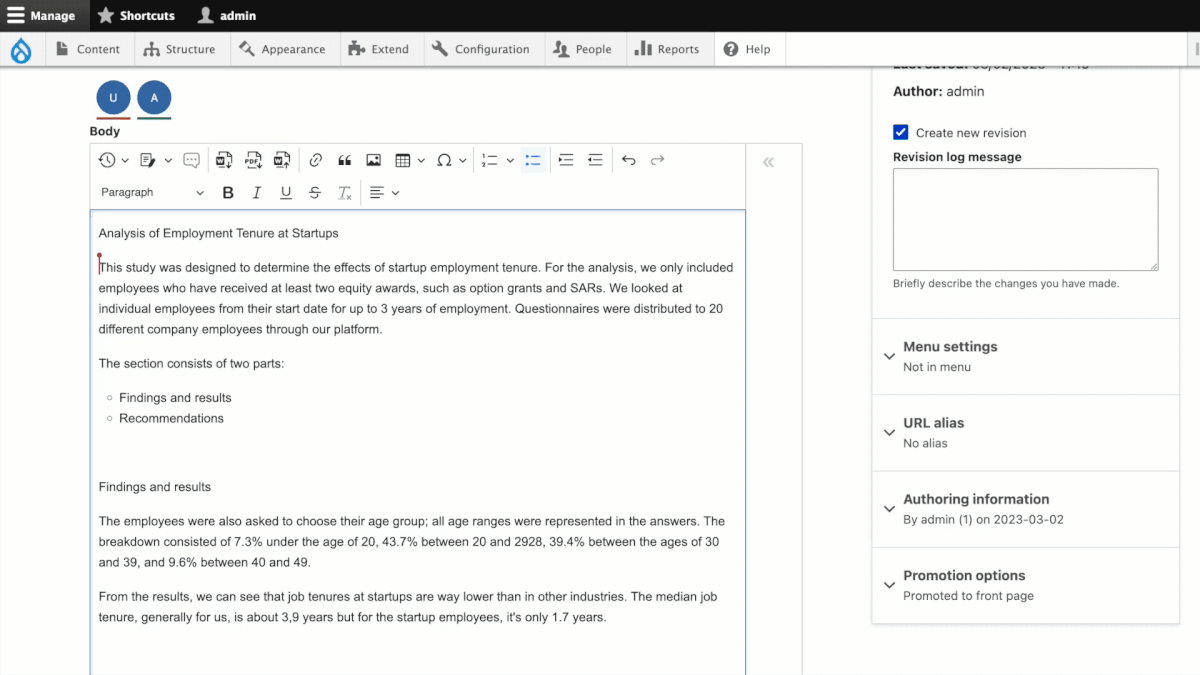
How does it work with other plugins?
Real-time collaboration – just like Comments, Track Changes, and Revision History features – is a standalone plugin. But all the collaboration features are compatible with each other, so when it comes to deciding which setup is best for you, the choice is yours:
- You can choose to only use the Real-time Collaboration plugin
- You can choose any combination of Comments, Track Changes, or Revision History and still be able to collaborate asynchronously (ie. not in real-time) without having to use the Real-time Collaboration plugin.
- You can choose to mix Real-time Collaboration with any combination of Comments, Track Changes, or Revision History for a more comprehensive collaboration experience.
Notifications, a Drupal exclusive
The Drupal Premium Features module also includes the very configurable Notifications plugin – exclusively built for Drupal. This plugin lets you decide which ‘events’ you’d like to be notified about, how you’d like to be notified, and the content in the notifications. The events that can be tracked include:
- Changes to a document’s content
- Changes to a suggestion status
- Mentions in the document or in a comment/suggestion
- A new suggestion
- A new comment
- A new reply to a comment thread or a suggestion.

How does it work?
You decide if each notification is sent immediately after the event once the node is saved or combined in a single message (like Google Docs) via CRON job.
Plus, you can configure the message templates for specific events. An important configuration feature is the notification context – which shows the context of the change (i.e. the portion of content in which the change occurred). You can either use the context or remove it from the template and just use the text. Information like changed node name, author of the changes, context, etc. is introduced by tokens, so that is automatically replaced by Drupal.
Drupal 10 is now more productive
As we mentioned, our collaborative features help you consolidate your content creation workflows into Drupal. Additionally, the Drupal Premium Features module helps users to manage their portable files more easily, in and around Drupal. This is where the converter plugins come in.
Export to PDF & Word
How does downloading your Drupal content as a PDF or Microsoft Word document with one click sound? The CKEditor 5 Export to PDF and Word feature makes that happen. There’s no additional setup needed, dependencies, or even a dialog. A single click is all that’s needed to get your file of choice straight to your drive. Of course, while exporting to Word all your suggestions and comments will be exported too!
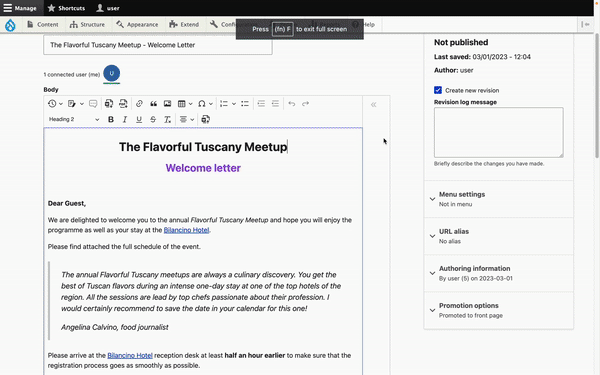
Import from Word
While CKEditor 5 includes excellent support for Paste from Word, sometimes you need some magic. Something a little bit faster. The Import from Word feature lets you upload .docx and .dotx files and import their content into CKEditor 5 with a click of a button.
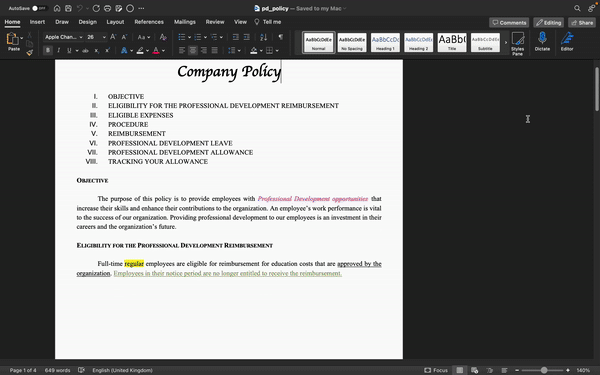
The Import from Word feature not only imports your text but also rich media and collaboration data, such as comments and suggestions. This feature can be exceptionally useful if you’re using Microsoft Word to collaborate and want to switch to CKEditor 5.
Mentions
Let’s finish the list of features with a surprise! The non-premium Mentions feature – which can connect existing users within your Drupal project – is also included in the module. Thanks to this feature, it’s possible to @mention other users in your content, in comments, or in replies to suggestions. All you have to do is start typing the name of the person, using the predefined marker #, and it gives you auto-completed user suggestions in a panel display next to the caret.
How to create more collaborative and productive Drupal projects
Want to improve the productivity of your workflows and improve cross-team collaboration, but you’re wondering what your next steps should be?
Step 1: Try and/or see
Try the Premium Features for yourself.:
- Option 1: There’s an installation guide that takes you through the process step-by-step. Sign up for the 30-day free trial, to get your license key and start using the Premium Features.
- Option 2: If you’d like to test the features right away without installing them, explore these Demo pages to see them all in action.
Step 2: Cloud vs on-premise
While asynchronous (ie. not real-time) features use your existing data settings and don’t send out any data, Real-time Collaboration, Export, and Import features use CKEditor Cloud Service.
This may not be ideal if you’re working on that secret project for the Client-Whose-Name-Cannot-Be-Mentioned or where the data can’t leave the internal network. In these cases, our full-fledged solution offers an on-premise version if you want your data to stay where it belongs.
Step 3: Pick and choose
Remember that CKEditor is a configurable and customizable framework, as is the Drupal module, its features, and its capabilities. All our features are standalone, so you can pick and choose the ones you’d like to include or exclude.
Step 4: Let’s chat
If you’re interested in learning more about the CKEditor Premium Features module for Drupal or customizing it further, please don’t hesitate to contact us.
